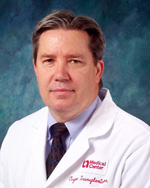Identifying new risk factors for vascular disease may help kidney transplant recipients lead longer, healthier lives.
A $2.6 million National Institutes of Health (NIH) grant is enabling UNMC researchers to examine how non-traditional risk factors could play a role in vascular disease in kidney transplant recipients. Vascular disease is the main cause of graft failure and mortality in the kidney transplant population and is the primary cause of death in the U.S. among the general populace.
 |
Jennifer Larsen, M.D. |
 |
R. Brian Stevens, M.D., Ph.D. |
 |
Gerald Groggel, M.D. |
 |
Julie Stoner, Ph.D. |
Dr. Larsen said Julie Stoner, Ph.D., a biostatistician in the department of preventive and societal medicine, will play a key role in analyzing the study data.
The study is being performed on the Omaha campus in the Clinical Research Center, a shared facility of UNMC and The Nebraska Medical Center. Eligible participants include individuals who received their kidney transplant at least six months ago and have adequate graft function.
Dr. Larsen said the study is made all the more timely by the fact diabetes is occurring at younger and younger ages — making kidney failure a greater risk during an individual’s lifespan. She said this trend is due in large part to the growing problem of obesity in America, including among youth. With obesity on the rise, she said it’s possible vascular disease may also increase over time, and present earlier.
What’s prompting the study, she said, is the fact that even when known vascular disease risk factors such as blood pressure, cholesterol and diabetes are controlled, kidney transplant patients still have a higher mortality rate from vascular disease. That’s why in addition to known risk factors, the study is looking at potential new disease markers, including insulin resistance, vitamin D deficiency, changes in parathyroid hormones and inflammation.
Patients are evaluated at their annual kidney transplant visit. Each will be observed for three years. In addition to blood tests, patients will undergo an ultrasound of their carotid arteries as a non-invasive measure of how blood vessel thickness changes over time. Data will be taken on patients’ exercise habits, family history, smoking habits, weight changes and other lifestyle factors.
“We’re looking at traditional and non-traditional risk factors to see how they affect the progression of vascular disease after transplant,” Dr. Larsen said, “and to see if there are some things we can do to prevent or regress vascular disease. Our findings will not only better identify how those risk factors work but lead to, hopefully, interventions that better control them.”
The ultimate goal, she said, is to “identify how we can improve the quality and quantity of life in this transplant population.” She added it’s possible the findings may have implications for the general population in terms of vascular disease prevention and intervention.
Dr. Larsen said the current study may set the stage for a future interventional study aimed at improving vascular disease outcomes.
UNMC is well-positioned to attract federal research dollars for studying transplant patients, she said, based on the large number of transplants it performs and the many innovations it uses.
“Transplantation has always been one of the areas of focus for UNMC and The Nebraska Medical Center, and the kidney transplant program has continued to expand,” she said. “We were one of the first programs that did simultaneous pancreas-kidney transplants and pancreas only transplants. Drs. (Lucile) Wrenshall and Stevens have greatly increased the number of living donors by developing laparoscopic techniques for harvesting the organ.
“Another example of how our center is leading the way is in post-transplant care. We have a team model that’s almost unparalleled in transplant centers around the country. I think that is why we have very good outcomes already, but we want to show how we can even improve those outcomes and what it takes to do that.”
She said the hallmark of UNMC’s approach is the “very strong collaboration” that exists between the multi-disciplinary team of physicians, nurses and other health professionals.
“The multi-disciplinary team reflects the fact we communicate with one another and participate in one another’s research, and we have for a number of years. This is how you have the very best care, not only for the immediate post-transplant period but for long-term transplant follow-up as well,” Dr. Larsen said.
UNMC’s kidney transplant center does follow up with hundreds of patients, including more than 1,000 individuals eligible for the study.
The NIH grant, believed to be the largest clinical grant ever awarded to the UNMC kidney transplant program, is primarily funded through the National Institute of Diabetes and Digestive and Kidney Diseases (www.niddk.nih.gov), one of the institutes that make up the NIH.